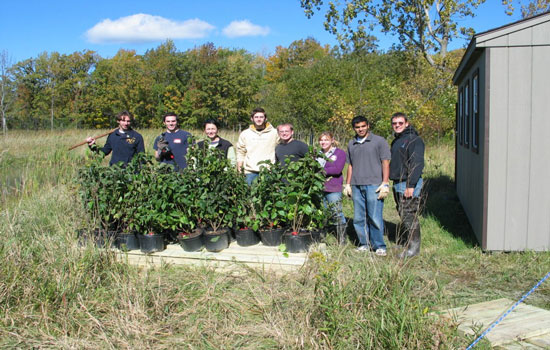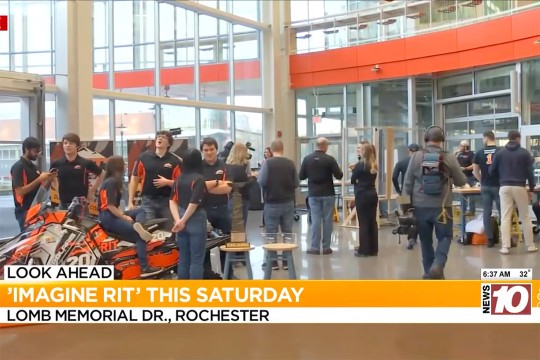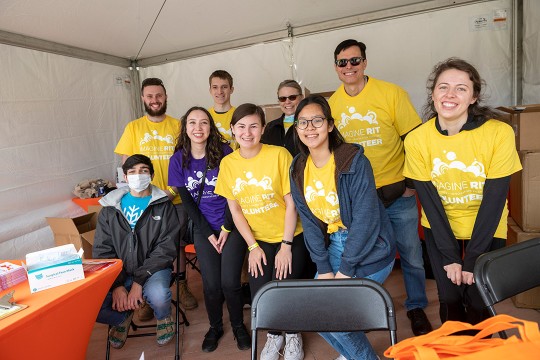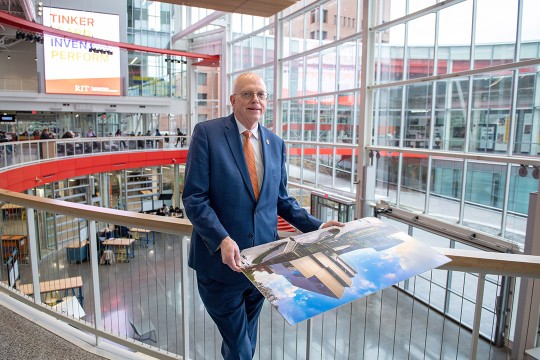Climate Change Action Awareness Week Seeks to Inspire and Empower Citizens
Events at RIT coincide with 2,000 simultaneous events in over 200 countries
RIT students and faculty recently participated in a tree planting to promote proper forest and wetland management as a means to combat global warming and climate change. The event was held in conjunction with theupcoming Climate Change Action Awareness Week, Oct. 19-24, which will highlight a host of citizen actions that can be used to reduce the world's carbon footprint.
Advocates for climate change reform will come together to better develop the tools necessary to effect change in individual communities all over the world. These global actions come six weeks before the world’s nations convene in Copenhagen for the United Nations Climate Change Conference to draw up a new international climate treaty to replace the Kyoto Accords.
At Rochester Institute of Technology, faculty, staff and students are hosting Climate Change Action Awareness Week Oct. 19-24, which will feature a series of symposia, panel discussions and training sessions designed to increase understanding about what individuals and groups can do to reduce their own environmental footprint and to more effectively lobby local, state and national leaders to implement better climate change policies.
“Climate change is one of the most important issues facing the world today and has a significant impact on nearly every major facet of society, including public policy, economics, medicine, environmental management and community development,” says Paulette Swartzfager, lecturer in the Department of English at RIT and co-organizer of climate action week. “Through international actions, citizens can stand up with one voice and demand that their leaders take more active steps to address this central problem.”
The week kicks off with the panel discussion How Do We Get There from Here? at 4 p.m. Oct. 19, in RIT’s Center for Student Innovation. The panel features several RIT faculty members discussing how their research has had a practical effect in addressing environmental and social issues. They will also discuss how public policy and community activities can be modified to better address the climate change issue and reduce our overall carbon footprint without unduly harming other aspects of society, such as economic development and job growth. The speakers include James Winebrake, chair of RIT’s Department of Science, Technology and Society/Public Policy; John Klofas, chair of RIT’s Department of Criminal Justice; and Danielle Smith, assistant professor of sociology and director of RIT’s honors program.
In addition, U.S. Congressman Eric Massa will hold a teleconference with students from RIT and Finger Lakes Community College on Oct. 23, updating the audience on current environmental and climate change reforms being considered by Congress. Massa will also provide greater understanding on what citizens can do to more effectively lobby Congress on national issues such as climate change.
The events conclude with Bike the Greenway, beginning at 10 a.m. Oct. 24, at the Sentinel on the RIT campus, where RIT faculty, students, and staff will meet to travel to the official starting point of the ride, downtown Rochester’s Central Library at 115 South Ave. There they will be joined by cyclists from other area colleges and organizations, as well as by RIT President Bill Destler and his wife, Rebecca Johnson, to travel en masse along the Rochester Greenway, a bike path linking downtown Rochester with RIT and the University of Rochester. At noon, the riders will arrive at RIT’s Center for Student Innovation, where a rally will highlight the need for alternative forms of transportation and the creation of enhanced infrastructure to increase bike traffic and pedestrian opportunities in communities.
The week is part of 350.org’s global effort to insist that world policy makers, as part of the Copenhagen treaty, make a commitment to reduce carbon dioxide levels in the atmosphere to less than 350 parts per million. CO2 is the leading cause of global warming and 350 parts per million is considered by most scientists to be the level needed to prevent further damage to the planet. Currently, CO2 levels average 384 parts per million, according to the United Nations.
For more information on these and other RIT events during Climate Change Action Awareness Week, visit the RIT Climate Change Action awareness week website.















